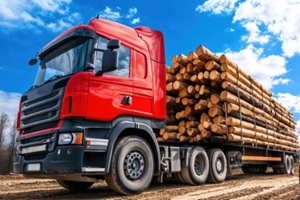
Logging remains one of the most hazardous occupations in the United States. With daily exposure to powerful machinery, sharp tools, and unpredictable environmental conditions, it’s no surprise that logging companies often experience high insurance costs and frequent claims.
Understanding the types of logging insurance claims most common in this industry can help business owners manage risk more effectively and select appropriate coverage.
Workers’ Compensation Claims
Workplace injuries in logging are far more frequent and severe than in many other industries. The U.S. Bureau of Labor Statistics (BLS) reports that the fatal injury rate for logging workers was 68.9 per 100,000 full-time workers in 2020, making it one of the highest of any field of work.
Typical injuries include:
- Being struck by falling trees or branches
- Chainsaw cuts and lacerations
- Falls from logging equipment
- Crush injuries from moving logs or equipment
Workers’ compensation insurance helps cover medical treatment, rehabilitation, and lost wages for injured employees. It also protects employers from lawsuits related to workplace injuries. For logging and other high-risk industries, this coverage is imperative for maintaining operational continuity.
Commercial Auto and Log Truck Claims
Log truck operations introduce serious liability and physical damage risks. Logging companies frequently file claims involving:
- Rollovers on rural or steep roads
- Collisions with passenger vehicles
- Cargo shifting or falling logs
- Weather-related accidents
A study published in the Journal of Forest Engineering found that 92% of logging businesses in the southern U.S. experienced increases in truck insurance costs between 2018 and 2021, with liability premiums often exceeding $30,000 per truck.
Commercial auto insurance protects both the vehicle and the driver, while motor truck cargo coverage addresses damage to or loss of the logs being transported.
Equipment Damage and Inland Marine Claims
Logging relies heavily on expensive, specialized machinery, including skidders, feller bunchers, loaders, and harvesters. These machines operate in rugged environments that put them at constant risk of:
- Fires
- Rollovers
- Falling debris
- Water damage
- Vandalism or theft
When equipment breaks down or is damaged, the resulting repair or replacement costs can quickly rise into the tens or hundreds of thousands of dollars.
Inland marine insurance typically covers mobile equipment and tools that standard property insurance policies exclude. This coverage is particularly useful for logging companies, as much of the equipment is constantly on the move between jobsites.

General Liability Claims
Logging operations may inadvertently cause damage to neighboring land or property. For example:
- Trees may fall onto adjacent parcels or structures
- Logging debris could damage fencing or private roads
- Public safety risks could arise near the site
General liability insurance helps cover legal defense, property damage, and medical expenses in the event that a non-employee is injured. These claims can be costly and can also tarnish a company’s reputation in the community.
Environmental Liability Claims
Forestry and logging companies are sometimes presented with environmental claims stemming from:
- Soil erosion
- Water contamination from fuel or oil spills
- Disturbance of protected habitats
- Logging outside approved boundaries
The Environmental Protection Agency (EPA) regulates cleanup responsibilities for such incidents. Unfortunately, cleanup and remediation costs can quickly reach six figures or more.
Environmental liability insurance helps cover these expenses, including regulatory fines and third-party lawsuits. Logging companies that operate near protected wetlands, water bodies, or residential areas should pay close attention to this risk.
Fire Damage
Logging sites in dry or remote areas can also become ignition points for wildfires, as machinery or chainsaws can generate sparks. Fires may damage logging equipment or spread to nearby forestland or property. Fire-related claims may be covered under different policies, such as property insurance, general liability, or specialized forestry insurance, depending on the cause and the damage.
According to the U.S. Forest Service, human activity is responsible for approximately 85% of wildfires in the U.S., including those inadvertently caused during logging operations.
How Logging Companies Can Reduce Claims
While having the right insurance is essential, preventing claims in the first place is even better for your bottom line. Logging companies can take several proactive steps:

- Provide and document OSHA-compliant safety training for all workers
- Regularly maintain equipment
- Enforce PPE usage on-site
- Use GPS and telematics on trucks to monitor driving behavior
- Create clear boundaries for logging sites
Taking these measures can reduce the frequency and severity of claims, potentially leading to lower insurance premiums over time.
Talk to Burton & Company About Your Logging Insurance Needs
Operating a logging company involves risks that other industries don’t experience. Burton & Company works with businesses across Virginia to build insurance packages designed specifically for logging and other high-risk industries. From workers’ compensation to environmental liability and beyond, we’ll help you put the right coverage in place so your business can keep moving forward.
Discuss your logging insurance options today by calling 888-652-1325 or by contacting us online to request a quote.

